#studying Korean
Explore tagged Tumblr posts
Text


11.29.2024 — 해피 금요일 여러분! Discussion is done, now ten pages of textbook 숙제, then a listening quiz. Let’s get to it! 화이팅~!
#college student#studying#korean language#studyblr#language student#language study#studying at home#student#online student#korean#language learning#learning korean#student life#study blog#studying inspo#study motivation#studying korean#college work#hangul#hangeul#한국어#한국어 공부
100 notes
·
View notes
Text
SINO KOREAN NUMBERS PT.2
2024년 8월 11일
안녕하세요 여러분!
As promise, second part is here!
Telephone numbers (05860791834)
Metro/Bus lines (Line 8 / Bus 576)
Height/Weight (150cm and 50kg)
Years (2024, 2000, etc)
Minutes and seconds (45min and 20 seconds)
Prices (5,000 wons)
Directions (Sherman, 42 Wallaby Way, Sydney)
HOW TO SAY PHONE NUMBERS:
Let’s take ( 05860791834 ) as our example.
You have to say number by number: 0-5-8-6-0-7-9-1-8-3-4
공(0) / 오(5) / 팔(8) / 육(6) / 공(0) / 칠(7) / 구(9) / 일(1) / 팔(8) / 삼(3) / 사(4)
For zero, you can say both (영/공)
HOW TO SAY METRO/BUS LINES:
Line 8 / Bus 576 = 팔번 / 오백칠십육번
We will use “번” to say “line”.
HOW TO SAY KILOS/CM:
150cm and 50kg = 백오십센치 / 오십���로
We use: 센치 for height and 킬로 for weight.
HOW TO SAY THE YEARS:
To say year we will use 년, for example:
Year 2022 = 이천이십이 년
HOW TO SAY MINUTES AND SECONDS:
For minutes, we will use 분 and for seconds we will use 초. For example:
45 minutes / 30 seconds = 사십오 분 // 삼십 초
HOW TO SAY PRICES:
30€ (euros) = 삼십 유로
4,000 ₩ (wons) = 사촌 원
56$ (dollars) = 오십육 달러
HOW TO SAY DIRECTIONS:
It’s the same as before, if you live in house number 40, you will say “사십”.
#koreannook#korean langblr#korean language#korean learning#korean studyblr#koreanblr#langblr#learn korean#learning korean#study korean#studyblr#studying korean#sino korean numbers#korean numbers#한국어#한국어 공부#한국어 배우기#한국어 공부하기
144 notes
·
View notes
Text
은어: 월루
(은어 - slang word)
월루 (월급 루팡) is a slang word made up of the words "월급" (salary) and "루팡" (Lupin, used in this context to refer to stealing based on the famous French novels). It literally means "salary stealing", and is used to refer to slacking off at work.
월루하는 중 - I'm slacking at work
#한국어#korean langblr#langblr#langvillage#한국어 공부#한국어 배우기#languages#language#language study#language learning#foreign language#foreign languages#studyblr#east asian languages#korean language#korean#learning korean#studying korean
45 notes
·
View notes
Text
The O.G.s of Korea
One recent show I watched was Trauma Code (중증외상센터) - a bit extreme but fun in that typical K-drama kind of way. Throughout the show characters get nicknames, and one of those was 조폭, which was translated as Gangster. Now I’ve heard multiple words that were translated as “gangster”, but this was a new one for me, so I decided to break down the differences.
깡패 - A thug, rough & violent. More of an individual criminal than literal gang member.
양아치 - A bully, punk, generally called this more because of their behavior, not serious crime.
날라리 - A troublemaker, delinquent. Similar to 양아치, but a bit more carefree.
조폭 - An actual violent person with power, generally in organized crime (closest to actual “gangster”).
Example Sentences
"어제 밤에 왠 깡패들이 가게에 와서 없던 자리세를 내라고 하면서 다 때려 부수고 갔지 뭐야?"
"What the hell, last night some gangsters came by the store and demanded protection fees while destroying everything."
“너 중학생 들한테 또 삥 뜯었어? 갑자기 탈색도 하고 이상한 문신도 하고, 진짜 양아치 다 됐네...”
"Did you steal the middle schooler's money again? Suddenly bleaching your hair and getting weird tattoos, you really have become a delinquent."
"학생 때 나는 완전 모범생이었고 그 애는 미래가 없는 날라리 같았는데, 나는 그냥 회사원이 되었고 걔는 유명한 유투버가 된 걸 보니 맥이 빠진다."
"When we were students I was a model student and they seemed like a futureless troublemaker, but now I'm just a office-worker and they are a famous YouTuber... so I feel so defeated."
"이 도시는 조폭들이 조직적으로 많은 사업을 운영하고 있어서, 그들과 엮이지 않고서는 진입하기가 쉽지 않아."
"The gangsters have organized and are running a lot of businesses in this city, not getting intertwined with them and entering is not easy."

Other fun related words
딴따라 - Entertainer
모범생 - Model student (opposite of 날라리)
#korean#한국어#한국어 공부#studyblr#한국어배우기#study korean#studying korean#learning korean#korean language#korean slang#slang#south korea
22 notes
·
View notes
Text
Semester in SK: Korean Curse Words
안녕하세요 여러분! I’m sharing yet another Instagram post with you all--this one is about a bunch of Korean curse words! Very silly, I know, but curse words are a big part of any language and can be fun to learn about! Of course, be careful when using these and please do not use them often--I’m just sharing them for fun and so you can recognize them if you hear them :) I hope you enjoy! 화이팅!

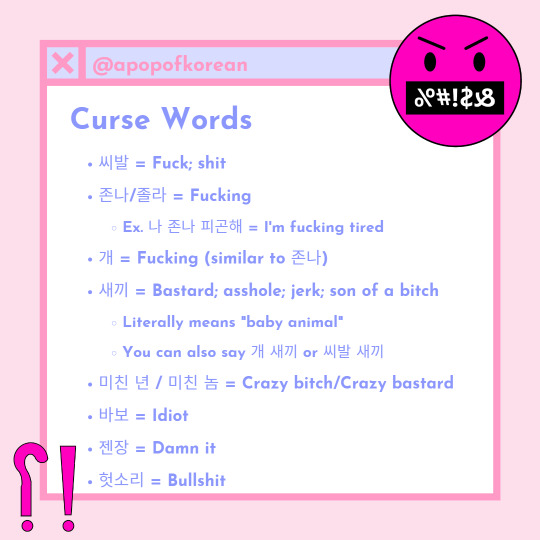
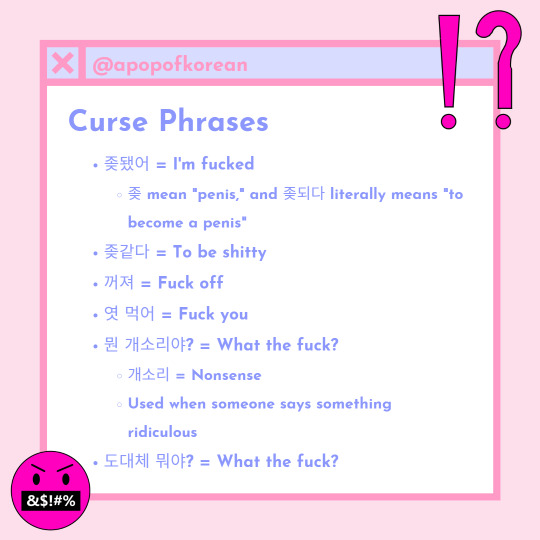
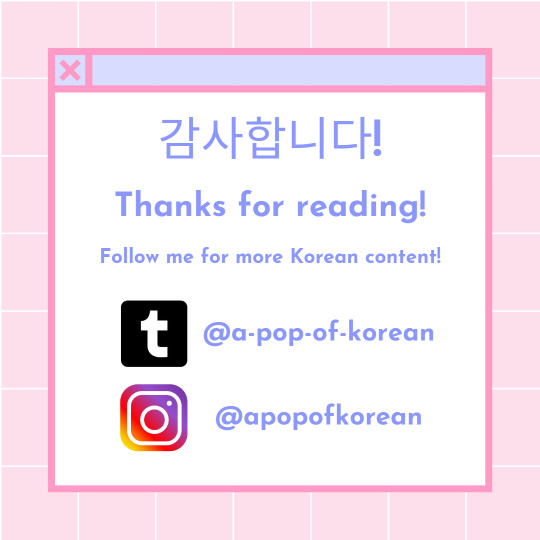
My masterlist
Join my Discord chat here to practice Korean with others!
Follow me on Instagram here for more Korean content!
Get Drops Premium using my affiliate link to expand your Korean vocab!
Check out my Ko-Fi to support this blog and my studies! Thank you for your generosity!
#korean#korean language#korean vocabulary#korean vocab#study abroad#learn korean#learning korean#study korean#studying korean#korean culture#유학#유학생활#한국#한국 문화#어휘#한국어#한국어 공부하기#한국어 배우기#langblr#korean langblr
487 notes
·
View notes
Text

stop being tired
#study study study#studystudystudy#study studying studygram studyblr studyabroad studyhard studyspo studymotivation studytime studyinspiration studyinspo studyaccount studyblo#study studyblr#study space#study session#studying aesthetic#studying abroad#studying korean#korean#learn korean#study korean#한국어#한국어 공부하기#배우다#studying#study aesthetic#study blog#study motivation#study notes#study inspiration#study inspo#studyinspo#studyblr#studyspo#studyspiration#aesthetic#study#rory gilmore#study tips
27 notes
·
View notes
Text
-(으)ㄹ까 말까”, ” -(으)ㄹ수록”, ” -(으)면 -(으)ㄹ수록”
Let's break down each grammar pattern with examples:
1. -(으)ㄹ까 말까
This grammar has two meanings.
-(으)ㄹ까 말까 “shall I or shall I not, whether or not,”
The first meaning is hesitation such as “shall I or shall I not, whether or not.”
Usage: This pattern expresses uncertainty or indecision about an action or situation. It presents a dilemma or a decision-making process where the person is contemplating an action, often translated as "whether or not to…"
Example Sentences:
축구를 할까 말까 고민하고 있다. (I'm debating whether or not to play soccer.)
여행을 가볼까 말까 생각 중이에요. (I'm thinking about whether or not to go on a trip.)
그 결정을 할까 말까 망설이고 있어요. (He/she is hesitating about whether or not to make that decision.)
When it has this meaning, Korean people often use this grammar with some particular verbs expressing thoughts and concerns, such as
망설이다 “to hesitate” 고민하다 “to consider” 고민 중이다 “to be considering” 생각하다 “to think” 생각 중이다 “to be thinking”
The second meaning is to express “uncertainty about an amount or quantity if it reaches a certain line.”
When it has this meaning, Korean people use it in the form of -(으)ㄹ까 말까 하다, or in the form of nouns + (이)가 될까 말까 하다 “(it) is just enough or a bit short.”
About the usage of -(으)ㄹ까 말까, you mainly use it for verbs.
For a verb, which does not have a final consonant, you attach ㄹ까 말까 to the stem.
For example, 가다 “to go” does not have a final consonant, so you attach ㄹ까 말까 to make 갈까 말까 “shall I go or not.”
If a verb has a final consonant, you attach -을까 말까 to the stem.
For example, 먹다 “to eat” has a final consonant.
So, you attach 을까 말까 to the stem to make 먹을까 말까 “shall I eat or not.”
Example sentence for the first meaning “whether or not.”
이 옷을 살까 말까 망설이는 중이에요. I am thinking about whether I should buy these clothes or not.
Here, 사다 “to buy” does not have a final consonant.
So, you add -ㄹ까 말까 to make 살까 말까 “whether I should buy or not.”
You can see hesitation through this expression, 살까 말까.
Example sentence for the second meaning, “just enough or a bit short” to express an amount.
작년에 심은 나무가 내 키를 넘을까 말까 할 정도로 자랐다. The tree I planted last year has grown up to the height which just barely exceeds my height.
Here, 넘다 “to exceed” has a final consonant.
So, you add -을까 말까 to make 넘을까 말까 “barely exceeds.”
Then, let’s read a sample sentence in the form of a noun + 이/가 될까 말까 하다.
강의가 시작한 지 1시간이 될까 말까 해요. It has been just one hour or less since the lecture started.
Here, 1시간 means “one hour.” 1 시간 has a final consonant, so you add 이 될까 말까 하다 to make 1시간이 될까 말까 하다 “the time just barely reaches one hour.”
2. -(으)ㄹ수록
-(으)ㄹ수록 “as you do smth~”
Usage: This pattern indicates that as something happens or progresses, another situation intensifies or becomes more pronounced. It's used to describe a proportional relationship between two events or states. It's translated as "the more… the more…"
Example Sentences:
더 많이 연습할수록 실력이 더 좋아진다. (The more you practice, the better your skills become.)
시간이 지날수록 그 사건을 잊을 수 없었다. (The more time passed, the more unforgettable that incident became.)
더 많은 경험을 쌓을수록 자신감이 생길 거예요. (The more experience you gain, the more confidence you will have.)
You use this when you notice that one situation changes to some degree, then another situation also changes.
To apply this grammar for verbs and adjectives, you attach -ㄹ수록 to the stem.
If a verb or an adjective does not have a final consonant, you attach ㄹ수록.
For example, 가다 “to go” does not have a final consonant. So, you attach -ㄹ수록 to make 갈수록 “as (I) go.”
If a verb or an adjective has a final consonant, you attach 을수록.
For example, 먹다 “to eat” has a final consonant.
So, you attach -을수록 to make 먹을수록 “as (I) eat.”
For nouns, you attach -일수록 regardless of a final consonant.
Besides, if you attach -(으)ㄹ수록 to 가다 “to go” to make 갈수록, you can sometimes translate it to “as you go”, but Korean people often use it as the meaning of “gradually.”
There is an idiom, 갈수록 태산이다, and this means “Gradually, you will see bigger mountains.” which means “Something is getting worse and worse.”
그때 일은 생각할수록 분해. The more I think about it, the more I get angry.
Here, 생각하다 “to think” is a verb which does not have a final consonant.
So, you add -ㄹ수록 to make 생각할수록 “the more (I) think.”
날씨가 더울수록 건강에 각별히 주의하세요. As the weather gets hotter, please take good care of your condition.
Here, 덥다 “to be hot” is an adjective which has a final consonant.
So, you add -을수록. However, you apply ㅂ irregular rule for 덥다.
So, 으 changes to 우, and it becomes 더울수록 “as (it) gets hotter.”
Then let’s look at the next sentence.
친하고 가까운 사이일수록 서로 예의를 잘 지켜야 돼. As a relationship is more intimate and closer, you should be more courteous to each other.
Here, 사이 “relationship” is a noun. So, you add -일수록 to make 사이일수록 “as a relationship is more ~.”
Then, let’s read a sample sentence of 갈수록 which you translate it as “gradually.”
회원 수가 처음에는 열 명뿐이었는데 갈수록 늘어나고 있어요. The number of members was only ten at first, but it gradually went up.
Here, if you translate 갈수록 into “as you go” the meaning of the sentence becomes “the number of members went up as you go”, and it sounds weird.
In these cases, 갈수록 means “gradually” or “more and more.”
3. -(으)면 -(으)ㄹ수록
-(으)면 -(으)ㄹ수록 “the more ~, the more ~.”
Usage: This pattern is an extension of -(으)ㄹ수록 and adds a conditional clause using -(으)면 (if) to indicate that as a particular condition is met or event occurs, another related outcome intensifies or changes correspondingly. It means "the more… (if/when) …, the more…"
Example Sentences:
더 열심히 공부하면 공부할수록 성적이 오를 거예요. (The more you study harder, the better your grades will get.)
날씨가 추워지면 추워질수록 집에서 더 오래 있게 되죠. (If the weather gets colder, you end up staying home longer.)
팀원들과 더 잘 협력하면 협력할수록 프로젝트가 더 잘 진행될 거예요. (The more you cooperate well with your team members, the smoother the project will progress.)
When you use the same verb or adjective repeatedly, you can express a gradual change such as “the more ~, the more ~.”
To apply this grammar for verbs and adjectives, you attach -(으)면 -(으)ㄹ수록 to the stem.
If a verb or an adjective does not have a final consonant, you attach -면 -ㄹ수록.
For example, 가다 “to go” does not have a final consonant.
So, you attach -면 -ㄹ수록 to the stem to make 가면 갈수록 “the more (I) go, the more~.”
If a verb or an adjective has a final consonant, you attach -으면 -을수록.
For example, 먹다 “to eat” has a final consonant.
So, you attach -으면 -을수록 to the stem to make 먹으면 먹을수록 “the more (I) eat, the more~.”
For nouns, you attach (이)면 일수록.
Example sentence:
이 영화는 보면 볼수록 빠져들어요. About this movie, the more you watch it, the more you will be into it.
보다 “to watch” does not have a final consonant.
So, you add -면 -ㄹ수록 to make 보면 볼수록 “the more you watch it, the more ~.”
빠져들다 “to be into smth” is a useful word in this case.
이 꽃은 기온이 높으면 높을수록 빨리 자란대. They say this flower grows faster as the temperature is higher.
Here, 높다 “to be high” has a final consonant.
So, you add -으면 -을수록 to make 높으면 높을수록 “the higher ~, the more ~.”
Explanation:
-(으)ㄹ까 말까: This pattern emphasizes indecision or uncertainty about whether to proceed with a particular action.
-(으)ㄹ수록: Indicates that as one situation progresses, another situation intensifies or changes accordingly.
-(으)면 -(으)ㄹ수록: Builds on -(으)ㄹ수록 by adding a conditional clause (-(으)면) to describe a scenario where the intensity or frequency increases depending on a certain condition being met.
These patterns are useful for expressing varying degrees of change or uncertainty in Korean sentences.
Grammar explanations and sentences from web page link below
#korean grammar#korean#koreanblr#study korean#한국어 배우기#한국어 공부하기#korean language#korean langblr#korean studyblr#korean study#learn korean#learning korean#studying korean#Korean blog#studyblr#koreanstudyinspo
15 notes
·
View notes
Text
My immersive Korean study schedule !!

After years of not practising, I'm getting back at Korean ! I used to be a low advanced level, but now I'm rebuilding my skills with an immersive 6-day study plan to regain fluency and pass TOPIK II in October. If you're also learning Korean, feel free to join me on this journey ! 💪
✨ My Study Goals ✨
✅ Pass TOPIK II (October 2025) ✅ Watch K-dramas without subtitles 🎬 ✅ Read Korean literature & webtoons 📚 ✅ Speak naturally with native speakers 🗣️
📅 My 6-Day Study Plan (2 Hours Per Day!)
🌸 Monday – Grammar & Writing
📖 1h: Study grammar with a textbook (TOPIK prep, grammar review, exercises, sentence-making) ✍️ 1h: Write a diary entry, essay, or a TOPIK writing prompt & get feedbacks!
🎧 Tuesday – Listening & Speaking
🎬 1h: Watch a K-drama or YouTube video without subtitles, then rewatch with them 🗣️ 1h: Shadow native speakers (podcasts, drama lines) & chat via language exchange apps
🔁 Wednesday – Review Day!
📓 2h: Revise grammar, vocabulary, and listening mistakes from earlier in the week
📚 Thursday – Vocabulary & Reading
📝 1h: Learn new words from a TOPIK list, manhwa, or novel (Anki/Quizlet!) 📖 1h: Read a Korean article, webtoon, or book—highlight unknown words & look them up!
🎙️ Friday – More Listening & Speaking!
🎧 1h: Listen to a Korean podcast (e.g., Talk to Me in Korean) & summarize in Korean 🗣️ 1h: Have a real conversation! Send voice messages or chat with a language partner
📝 Saturday – TOPIK Practice & Fun Immersion
📝 1h: Take a TOPIK II practice test (listening or reading) under timed conditions 🎭 1h: Fun immersion! K-dramas, music, reading, chatting with native speakers
☕ Sunday – Rest or Light Korean
(Optional: Just listen to K-pop, watch a drama, or read for fun!)
🌿 Study Tools I’m Using!
📖 Textbooks 🎧 Podcasts 📱 Apps 📺 YouTube 📚 Reading
💬 Are you learning Korean too? Drop your favorite study methods below & let’s motivate each other! 🎉💖
#studying#learningkorean#study blog#study motivation#study#studyblr#korean#learning korean#studying korean
3 notes
·
View notes
Text
Hangul: batchim pt. 2.
2024년 7월 30일
안녕하세요 여러분!
Hoy vamos a aprender como pronunciar una palabra cuando tiene dos consonantes en una de las sílabas. Es más fácil de lo que imaginas, y una vez te hagas a ello, podrás hacerlo sin problemas (solo tienes que aprenderte esta regla).
Os daré unos ejemplos de palabras que tienen este suceso, para que veáis a qué me refiero.
넋, 앉, 값, 많, 싫, 여덟, 곬, 핥, 닭, 삶, 읊
Como puedes ver, todas ellas llevan dos consonantes al final de la sílaba (en la parte baja), y solo una de esas dos consonantes, tiene que sonar.
Entonces, ¿cuál tenemos que pronunciar?
Solo se pronuncian las consonantes marcadas en morado. Estos son las únicas mezclas de dos consonantes, así que, una vez te aprendas estas, podrás decir cualquier palabra.
ㄱㅅ - ㄴㅈ - ㅂㅅ - ㄴㅎ
ㄹㅎ - ㄹㅂ - ㄹㅅ - ㄹㅌ
ㄹㄱ - ㄹㅁ - ㄹㅍ
Así que, cuando digas 넋 tienes que decir “넉” (¡¡¡¡ esto es solo un ejemplo escrito para que sepáis cómo se pronuncia !!!!)
Hay algunas excepciones
Si la palabra tiene ㄺ seguido de ㄱ, entonces, se pronuncia la ㄹ.
Si en la siguiente sílaba, empieza con una vocal, entonces, las dos consonantes se pronuncian.
Si la sílaba termina con dos consonantes, pero la siguiente sílaba empieza con ㅎ, entonces, no suena con la siguiente sílaba, aunque tenga una vocal (Ej.: 많이 suena como si dijeras 마니.)
#coreanoencasa#coreano#aprende coreano#aprender coreano#estudia coreano#korean language#korean langblr#korean learning#korean studyblr#koreanblr#learning korean#learn korean#study korean#studying korean#korean hangul#hangul#korean batchim#batchim#한국어#한국어 공부#한국어 배우기#한국어 공부하기
4 notes
·
View notes
Text
im going to start following more korean learners here to gain motivation to get back to my korean studies
3 notes
·
View notes
Text


01.10.2025 — Recording assignment and vocabulary practice today. If I have time, I’ll also start the writing assignment that’s due Monday. 여러분, 화이팅!
#college student#studying#korean language#studyblr#language student#language study#studying at home#student#online student#korean#language learning#learning korean#student life#study blog#studying inspo#study motivation#studying korean#college work#한국어 공부#한국어#한국어 학생#학생#대학생
112 notes
·
View notes
Text
PERSONAL PRONOUNS
2024년 8월 5일
안녕하세요 여러분!
Today we are going to learn personal pronouns, as well as when to use some suffixes to add to the name of the person we are going to talk to.
The blue ones are in the informal form and the purple ones are in the formal form. Always try to use the formal form when you start speaking and/or writing. If there is an X, that means there is no word to say that.
I = 나 / 저
You = 너 / X
He/She = 그 (he) or 그녀 (she) / 그분 (both)
We = 우리 / 저희
You = 너희 / X
They = 그들 (group of boys) or 그녀들 (group of girls) / 그분들 (all)
We only used 그분 or 그분들 when that person is not with us in the moment we talk about them.
How we can address someone who is our boss or someone who has a more power than us? There are words for this one, so we won't use any of the pronouns learnt today. For example: Boss (상사님), Teacher (선생님). That 님 means kind of "sir".
OTHER WAYS TO CALL PEOPLE:
If we don't know the person, we add -씨 at the end of their name: 송 민기씨.
If the person is our friend, we add -이 at the end of their name ONLY if ends with a consonant: 김강민이. This only works with korean names, don't do this with foreigner names.
If you want to call someone (a friend) who is a little far away from you, we will use -아 at the end of their name if ends with a consonant or -야 if ends with vowels: 신정근아 or 김준호야.
And that's all for today!
If you have any question, please, feel free to ask me !
#koreannook#korean langblr#korean language#korean learning#learn korean#learning korean#study korean#studying korean#korean studyblr#koreanblr#langblr#studyblr#korean personal pronouns#persona pronouns#한국어#한국어 공부#한국어 배우기#한국어 공부하기
60 notes
·
View notes
Text
Korean vocabulary
나누다 - divide; split
"원래 하나였던 것을 둘 이상의 부분이나 조각이 되게 하다."
To divide something that was one into two or more parts or pieces.
나는 케이크를 열 조각으로 나누어 사람들에게 한 조각씩 주었다.
문명 (文明) - civilization
"사람의 물질적, 기술적, 사회적 생활이 발전한 상태."
An advanced state of material, technological and social life for humans.
대기 오염과 수질 오염 등의 환경 문제가 현대 문명을 위협하고 있다.
세계화 (世界化) - globalization
"세계 여러 나라를 이해하고 세계적으로 나아감. 또는 그렇게 되게 함."
The act of understanding many countries and advancing globally, or making something that way.
인터넷 등 정보 통신 기술의 발달로 인해 국가들 간의 거리가 좁혀져 세계화가 빠른 속도로 이루어지고 있다.
풍족하다 (豐足-) - abundant; plentiful; rich (also: well off)
"매우 넉넉해서 부족함이 없다."
Being enough and ample, without a shortage.
복권에 당첨된 뒤 그들은 당첨금으로 풍족한 삶을 누렸다.
짐승 - animal, creature, beast; brute
1 "몸에 털이 나고 네 발을 가진, 사람이 아닌 동물."
An animal other than a human, with four feet and body hair.
숲 속에서 짐승 두 마리가 어슬렁어슬렁 마을로 내려왔다.
2 "(비유적으로) 매우 잔인하거나 야만적인 사람."
(figurative) A person who is very violent or barbarous.
게걸스럽게 먹어 대는 사내의 모습은 마치 짐승 같았다.
속삭이다 - whisper
"남이 알아듣지 못하게 작은 목소리로 가만가만 이야기하다."
To talk in a small voice repeatedly, so that others cannot hear.
승규는 친구에게 슬쩍 집에 가자고 속삭였다.
비키다 - step aside; step back
"마주치거나 부딪치지 않으려고 있던 곳에서 자리를 조금 옮기다."
To move slightly in order not to bump against or run against someone or something.
여기에 서 있으면 불꽃이 튈 수도 있으니 멀리 비켜 있어라.
맴돌다 - remain; linger, keep coming back
1 "어떤 상태 등이 일정한 범위 안에서 계속되거나 머물러 있다."
For a certain state to continue or linger within a certain range.
뚜렷한 단서를 찾지 못해 수사가 원점을 맴돌고 있다.
2 "같은 생각이나 느낌 등이 반복되다."
For a thought or feeling to be repeated.
그는 지수가 화가 나서 뱉은 말이 계속 맴돌아 마음이 좋지 않았다.
(definitions and examples taken from naver dictionary)
#한국어#korean langblr#langvillage#langblr#한국어 배우기#한국어 공부#한국어 공부하기#foreign languages#language learning#languages#foreign language#polyglot#duolingo#study korean#studyblr#studyspo#studying korean#language study#learning languages#korean language#korean learning
12 notes
·
View notes
Text
(BlackPink) In Your Area! / ~세권
One phrase that you may not come across unless you live in Korea is ~세권. The most common term used with this is 역세권. It’s hard to directly translate this, but roughly means “Near a train station” - generally within a 5-10 minute range.
Ex:
“역세권 아파트다 트리플 역세권이다”
“It’s an apartment with stations in the neighborhood. It’s a triple station area”
Let’s break this down:
역 (驛) - (Train / subway) station
세 (勢) - Influence
권 (圈) - Range, Radius
Directly translated it’d be something like “The influence / strength of being in range of a station” So having a “역세권 아파트” is a positive feature for your apartment. This also can be used for other convenient or positive places within a neighborhood.
스세권 (스 = 스타벅스) - Starbucks in the neighborhood
편세권 (편 = 편의점) - Convenience store in the neighborhood
슬세권 (슬 = 슬리퍼) - Being close enough to a good place (like cafe or 맛집) that you could wear your slippers
Example:
“와 동네 진짜 좋네~ 역세권인데 또 스세권인 아파트네!”
“Wow, this neighborhood is really great~ It’s not only close to the station, but also right near a Starbucks too”
For fun try thinking about what kind of area of influence your apartment or house has.
#korean#한국어#studyblr#한국어 공부#한국어배우기#study korean#learning korean#learn korean#korean language#korean slang#slang#linguistics#korea#south korea#kpop#studying korean#study#studying
33 notes
·
View notes
Text
Heya!
I am searching for books/workbooks that may have Korean grammar and comprehension exercises. Do you have any rec? Or maybe other tye of resources/suggestions? Actually I have found a book but it has too many pages on practicing hangul (not saying I don't need it but I already have tabs to do that)... And I cannot find anymore the book I had found last summer from which I tried a couple of exercises (it had short stories written in Korean + in English and then vocabulary, notes, comprehension and writing activities).
Right now I have found this YT channel and it's very good especially for listening comprehension, but I think a book would help me too.
youtube
6 notes
·
View notes
Text
Advanced / Lesson 23: Korean Idioms
안녕하세요 여러분! Today I have an advanced lesson I'm that I posted on my Instagram recently: it's about Korean idioms! I learned these in my Korean class while abroad and enjoyed them a lot, so I hope you do too! Let's start!
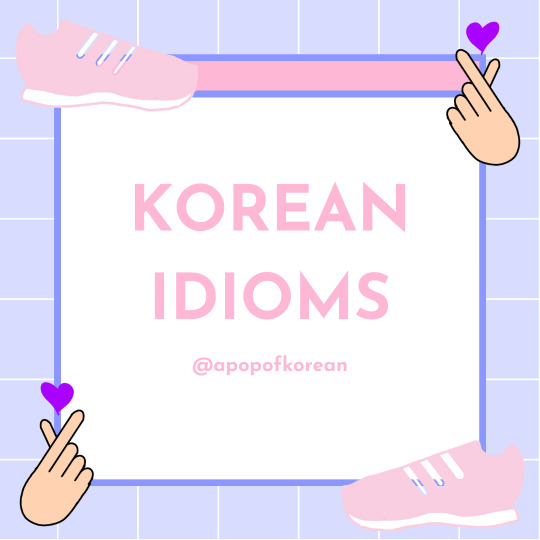
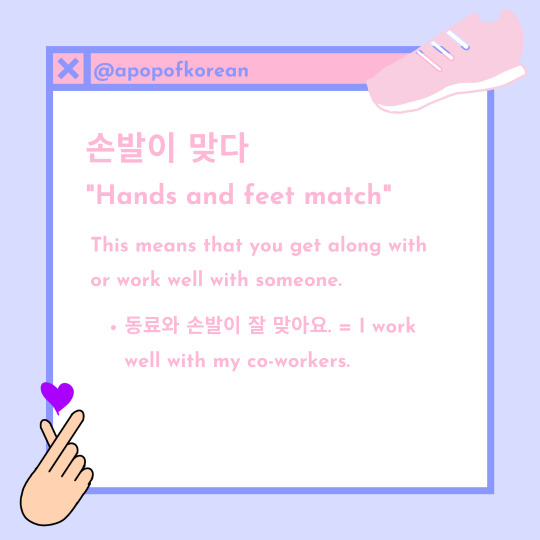




My masterlist
Join my Discord chat here to practice Korean with others!
Follow me on Instagram here for more Korean content!
Check out my Ko-Fi to support this blog and my studies! Thank you for your generosity!
#korean#korean language#learn korean#learning korean#study korean#studying korean#korean langblr#langblr#advanced korean#한국어#한국어 배우기#한국어 공부하기#한글#한국말
145 notes
·
View notes